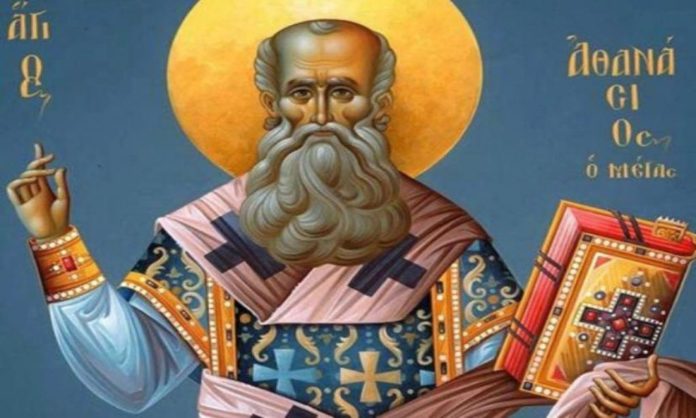Athanasios the Great, the so-called "pillar of orthodoxy", served as Bishop for 46 years, of which 17 passed them to exile……….
Following his conviction by the First Ecumenical Council, The Arius did not comply with her decisions. Although it was disliked and exiled, did not repent. The confession of the faith of the Supreme, who avoided the extreme elements he had before the meeting expressed, Emperor Constantine also accepted her influenced by a pioneer of views, that were later characterized by Arianist, Eusebius Nicomedia, resulting in order to order, the Areios to be accepted in ecclesiastical society. Athanasius opposed, Because he was in conflict with the arguments and decisions of the Nice Ecumenical Council.
This resulted in the month of the "Aryan" bishops, who found the opportunity to expel Athanasius because of his militancy and effectiveness against them. Bishops drawn up with the Supreme Council positions with other bishops, who were later described as "Melitian's heresy", sending a delegation to the emperor, accusing Athanasius of imposing taxes in favor of the church, For magic and prostitution. Initially a meeting was convened in Caesarea, in which he did not attend, Knowing that it was a deliberate form of opponent bishops. But the emperor also convened a second session in Tire, stalling him, that if he did not attend, would be exercised violence in order to attend. Thus appeared, rejecting all categories.
Athanasius was found, After the meeting, in a difficult position taking messages, at the expense of his life. For this reason he appeared in Constantinople, to see the emperor and ask him to protect him. But his opponents succeeded not only not to hear, but also to be persecuted in Galatia, persuading the emperor with false accusations. He himself, seems to have been unhappy at the expense of Athanasius for the intense criticism he was doing to him. This was his first exile of, which lasted 2 years and 4 months, returning the 337 AD after the death of Emperor Constantine.
Athanasius' return, continued with a lot of slander, and in trying to refute them, convened a meeting 100 Bishops who proclaimed the innocence of. As well as Aryans, doing the exact opposite, convincing the new pro -Agency Emperor Constantius. So is exiled to Rome where July, bishop, convenes a meeting and declares his innocence and faith in the Nice symbol. Emperor Constantius pushes Constanta's brother, to extend the exile of, Despite Rome's synodic decision. Result the return of, the 346 A.D., 6 years after the exile of. Athanasios because of the pastoral work he performed, seems to have been loved and hugged by the city's Christians.
The 356 Constanta is murdered, Constantius becomes a monocler of the western and eastern part of the empire and the Aryan bishops, taking advantage of this opportunity, are moving decisively. They call a meeting, They make Athanasius and send a reign 5000 soldiers with Roman soldier Syrian, in order to eliminate him permanently. At the time ends the pancake in a temple, with a multitude of believers, He is escorted to the desert, where for six years he escapes arrest with the help of friendly monks and virgins. At that time Athanasios found the opportunity to write a very large number of his works, while at the same time conducting a severe campaign, to suppress any Martian influence.
On his return, After Constanta's death, Julian rises to the throne. Julian recalls all exquisite bishops, Among them and Athanasius. The conflict between the two men's wishes appears directly. Julian wants to restore the status of pantheon, On the other hand Athanasios fights with all his might to restore the church. Julian is informed of Athanasius' action and orders exile. The 362 A.D. exiled to Thebaida until Julian's death. But it is once again exiled.
While returning and initially proceeded, seamlessly his work, In the time Ivian to the 364 A.D. and his death, He succeeds him by Walledinian I, who was a fan of the Supreme and expels Athanasius. This is how we are informed that at this time it was hidden "in a memory of memory". Within four months, however, fearing uprising by the indignation of Alexandria residents, recalled from exile Athanasius. Since then until his death, remained in place, persecutionless.
